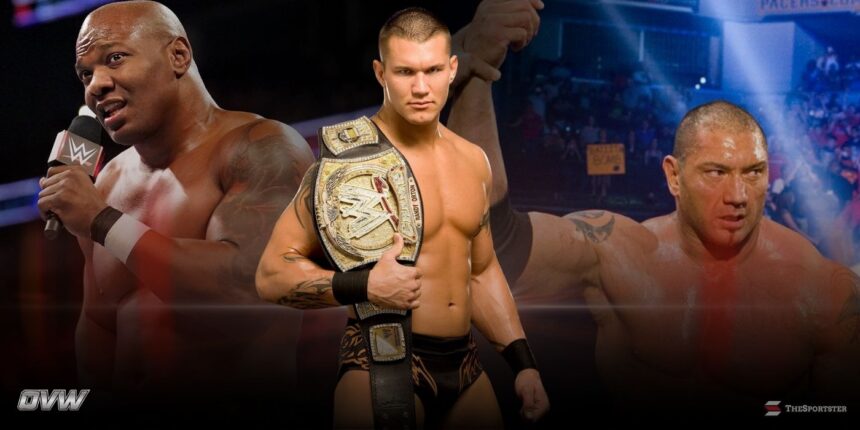Before NXT became WWE’s primary developmental brand, WWE relied on various farm systems across the U.S. to train and groom future stars. Among these, Ohio Valley Wrestling (OVW) stood out as WWE’s key developmental territory from 2000 to 2008, where many rising talents adapted to WWE’s style before joining the main roster.
The 2002 OVW class is widely regarded as one of the most impactful in WWE history. This group produced several stars who collectively won over 60 WWE championships, including multiple world titles. Key members like John Cena, Brock Lesnar, Randy Orton, and Batista shaped WWE’s landscape for years, with the 2002 class often cited as one of WWE’s greatest talent pools.
In 2025, some of these talents still actively compete or contribute to wrestling, with John Cena and Randy Orton both wrestling regularly in WWE. Shelton Benjamin found success at AEW, while Batista retired from wrestling to focus on his acting career. Rico, the least decorated wrestler of the group, transitioned to law enforcement but has made occasional indie and AEW appearances.
Rico’s WWE tenure was marked by holding only two tag team championships, often in gimmicky roles, and he didn’t reach the heights of his 2002 peers. Charlie Haas, on the other hand, enjoyed more tag team success, mainly alongside Shelton Benjamin, though his singles career was less successful and he was released quietly after 2004.
Batista distinguished himself as a six-time world champion with a strong WWE career and later transitioned into a successful Hollywood acting career, with notable roles in the Guardians of the Galaxy and Avengers franchises. His charisma and evolving in-ring skills helped him rise above early doubts about his potential.
Shelton Benjamin remained one of WWE’s most underrated performers, excelling in both singles and tag team wrestling. Though never a world champion, he won several secondary titles and continued wrestling competitively well into his late 40s, including a notable AEW run.
Randy Orton has established himself as one of WWE’s most reliable performers, holding 10 WWE Championships and maintaining a consistent presence at the top since 2002. Even with some criticism for his match style, Orton’s longevity and main-event status are proof of his skill and dedication.
Brock Lesnar, despite being a part-time wrestler, dominated WWE’s main titles and made history by ending The Undertaker’s WrestleMania streak. Lesnar’s powerful presence and crossover success in MMA cemented his star status, though recent allegations have clouded his future in wrestling.
John Cena emerged as WWE’s definitive face, becoming the most decorated world champion in WWE history. His influence extends beyond wrestling, becoming a global icon and successful actor, while continuing to perform in WWE in recent years.
Looking at the legacy of the 2002 OVW class, the combined achievements and impact of these wrestlers are extraordinary. Many became marquee main eventers, crossover stars, and legends, shaping professional wrestling’s modern era.
Today, these stars have taken diverse paths: Cena and Batista excel in Hollywood; Orton and Benjamin continue wrestling; Lesnar and Rico have stepped away from wrestling for quieter lives. Their varied trajectories highlight the lasting influence and evolving nature of careers in professional wrestling.
Fan Take: The 2002 OVW class is a testament to WWE’s developmental system’s ability to create future legends, showcasing how talent can evolve from farm systems into global superstars. For WWE fans, their stories offer hope for the next generation of wrestlers and underscore the importance of nurturing rising stars to sustain the sport’s legacy.













